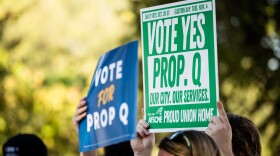The Austin City Council will spend the coming days trying to balance the city’s budget. That's after residents voted down a controversial property tax rate increase known as Proposition Q, which was expected to generate nearly $110 million.
The council has canceled a special called meeting scheduled for Thursday to go over changes to the city budget. City Manager T.C. Broadnax said in an email to council members that the city received a complaint Wednesday about a possible violation of the Texas Open Meetings Act in the posting language for the meeting.
Broadnax said the city's legal team believes it met state requirements, but said "our goal with the budget is to restore trust in the City, so we are willing to take additional steps to achieve that goal."
The council is now set to take up the budget changes on Tuesday, Nov. 18. Council members are aiming to adopt an amended budget by Nov. 20.
Last weekend, staff in Austin’s budget office proposed cuts that reach across many city departments, including nearly $6.3 million in cuts to emergency medical services.
James Monks, president of the Austin EMS Association, said money from Prop Q could have meant hiring more staff and purchasing new equipment.
“[Now] it’s going to mean less paramedics on the street, and more work for the paramedics we already have out there, who are already struggling, who are already dealing with overwork burnout, mental health issues and constant stress,” Monks said.
He said the department is at a breaking point, and something has to change, especially as medics work to reduce response times and serve a growing population.
“If you have a medical emergency in Travis County as a whole, you're going to be getting one of our ambulances,” Monks said. “And so, whether you work here, whether you live here, whether you visit here, you are going to be impacted by this.”
The city manager proposed a balanced budget in July which included cuts to many programs, from reductions to overtime spending for police and fire to less money for social services programs, like afterschool care and programs that benefit elderly residents. Several council members felt it didn’t do enough to serve residents.
Prop Q was a plea from Austin officials to fund more services, including rent assistance and addressing public safety gaps, such as more staffing and equipment for EMS.
In August, City Council adopted a $6.3 billion budget with the caveat that voters would have to approve a higher property tax rate. The increase was set to cost the average homeowner an additional $300 on their next tax bill.
Ultimately though, Prop Q failed, with 63% of Austinites rejecting the measure. The political action committee Save Austin Now was one of the most vocal opponents of the increase.
“We had a broad bipartisan coalition that stood up and said, ‘No, we are not standing up for this,'” attorney Adam Loewy said on election night. “Enough is enough. The spending must stop, we do not need more taxes, and this city council needs to get the message to get their house in order.”

Without an extra $110 million, City Council will have to work through the budget process once again and decide what programs to cut.
Mayor Kirk Watson said in a statement last week that he heard voters’ concerns about affordability and spending at City Hall. He said the council should respond with a “straightforward budget process that focuses on basic services and basic budgeting.”
Marc Duchen, the only council member to vote against the budget and tax rate election, agreed with the mayor.
“We’re going to have to make probably some tough choices over the next two weeks,” Duchen said. “But I'm also confident that we can work through them and approve a budget that covers all of the core things that people are counting on us for. That’s public safety, parks, social services and libraries.”







